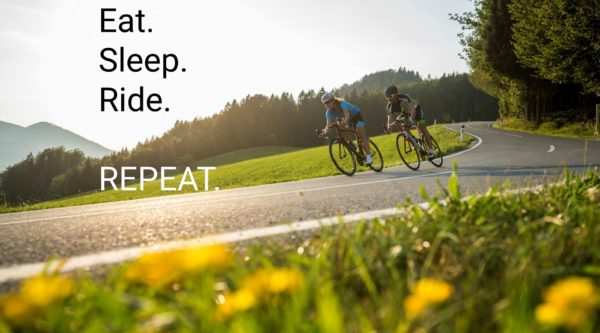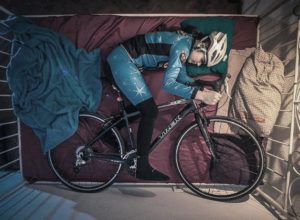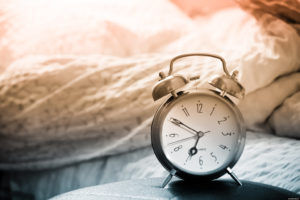You may not think sleep and cycling have much to do with each other, but that could not be further from the truth. Not only is sleep how your body recovers and prepares for the next day’s ride, but cycling can actually help you sleep better at night. Not getting enough sleep is one of the most common mistakes cyclists make. Experienced cyclists know that sacrificing sleep defeats the purpose of training, that a body won’t recover sufficiently, or adapt to strenuous exercise without adequate sleep.

Sleep has become such a hot-button for professional cyclists, that cycling’s governing body, the International Cycling Union, decreed that a comfortable bed’s positive impact on sleep would grant competitive advantages to cyclists who had adequate sleeping accommodations.
Professor Peter Hespel of Belgium’s Louvain University checked in with a simple statement. “Sleep is key to athletic success.” he said. “In sport we use all manner of measures to relax such as massages, etc. But sleep is the most important of all. Only through sleep can the body recover from the stress and strain of the day. If a competitor can sleep every night under perfect conditions, ideal mattress, temperature, humidity, he or she is much more fit the next day than the rest of the field.”
Recovery Science
Felicia Stoler, RD, an exercise physiologist and registered dietitian in New Jersey, says that, “Sleep is the time when your body repairs itself,” she says. “If we don’t get enough sleep, we don’t perform well.” Training actually makes you slower while it’s sleep that makes you a faster cyclist.
A report from the American College of Sports Medicine revealed that sleep deprivation wasn’t good for cycling performance; the rate of perceived exertion during cycling was significantly higher and the time to exhaustion was less. In the study, cyclists managed an average of 20.6 minutes to exhaustion after a normal night’s sleep, but only 18.9 minutes when they were sleep deprived.
Dr. Allen Lim is a sports physiologist and cycling coach. His advise is as follows:
“Ditch the complicated formulas you’ve established for yourself and let sleep dictate your training schedule if you’re feeling tired or stayed up too late. It’s more beneficial to cut down on volume and intensity, and do your intervals when you’re feeling fresh and rested.”
How to Know You’re Not Rested
Signs that you don’t have enough sleep are fairly obvious and if you think about them, you’ll probably recognize them in our own routine:
- Lethargic in attitude and body
- Insomnia and or restlessness
- Run down or depressed
- More than average anxiety
- Indecisive, irritable
- Lack of concentration on simple tasks
- Loss of appetite, weight loss
- Getting sick, colds, flu etc.
How Much Sleep Do You Need?
 The minimum people need is about 7 to 9 hours of sleep a night, according to David Geier, MD, an orthopedic surgeon and sports medicine specialist. ” If you’re an athlete in training, you may need more. Just as athletes need more calories than most people when they’re in training, they need more sleep too,” Geier says. You’re pushing your body in practice, so you need more time to recover.
The minimum people need is about 7 to 9 hours of sleep a night, according to David Geier, MD, an orthopedic surgeon and sports medicine specialist. ” If you’re an athlete in training, you may need more. Just as athletes need more calories than most people when they’re in training, they need more sleep too,” Geier says. You’re pushing your body in practice, so you need more time to recover.For many cyclists who lead busy lives, it’s important to think less about fitting training around work, and more about fitting life around recovery. If you have a busy life, do less training if you have to to get more sleep. Form a training plan that fits in with your life, rather than one that fits with dates on the calendar.
Dr. Stewart Armstrong is a cycling health adviser. He say’s that the vast majority of cyclists require 7-to-8 hours of sleep. Some can survive on less, some require more. “The thing that is though,” Armstrong says, “is that you need to be in bed for 8-to-9 hours, because falling asleep, and staying asleep requires extra time in the sack.”
Jim Thornton, president of the National Athletic Trainers Association agrees with Geier. “Athletes in training should sleep about an hour extra than average. You can go to sleep earlier, or take an afternoon nap,” Geir says.
Sleep Deprivation
If you are sleep deprived for a week, averaging less than 4-to-5 hours, sleeping in on a Saturday, 9-to-10 hours can go a long way to getting your baseline of 8-to-9 hours back on track. But to return to normal, you really need two good nights of sleep.” Armstrong adds. There are numerous studies that indicate that a lack of sleep negatively impacts athletic performance. According to the American Academy of Sleep Science the lack of sleep increases levels of the stress hormone cortisol, and decreases the level of the recovery as well as the amount of growth hormone in your body.
Tips to Sleep
- Get on a regular schedule. Arrive early at your ride or race destination. Get up and go to bed at the same time you always do.
- Don’t do sleep drugs, unless prescribed by a doctor. Over the counter sleep medications disturb the quality of your sleep and can make you feel lethargic the next day.
- Reduce alcohol and caffeine consumption — not likely for cyclists but advisable.
- Employ natural relaxation techniques before bed to help you fall asleep. Deep breathing is one way to relax along with yoga.
Cycling calms anxiety, and anxiety is a symptom that you may not be sleeping enough in the first place. The relationship to cycling and anxiety is the positive effect that cycling has on serotonin, which occurs naturally with cycling, and promotes healthy sleep. So it’s a no-brainer. Get on your bike, keep riding and sleep better. See you in the morning.